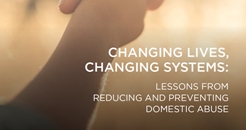 Lessons from reducing and preventing domestic abuse
Lessons from reducing and preventing domestic abuse
From a report by Social Finance
Social Finance and Lloyds Bank Foundation have published report which shares learning from practical experience of creating systemic change. It focuses on lessons learnt by Drive - a partnership across statutory and voluntary agencies responding to perpetrators of domestic violence and abuse to keep victims and survivors safe.
Responses to social problems are not as effective as they could be because different initiatives, organisations and funding streams work in disconnected ways. Systems change is about shifting the way a whole system works around a specific social issue in order to ensure long lasting change.
Drive shows systems change in practice as it is influencing the overall response to domestic violence by the police, social services, other parts of local government, and the wider voluntary sector.
The Covid-19 pandemic has been shadowed by a second crisis – a surge in domestic violence and abuse. There has been a welcome, if overdue, increase in the attention and urgency given to tackling this issue.
The Drive partnership has been working to change the response to domestic violence and abuse since 2015, building on the partners’ years of experience. Respect, SafeLives, Social Finance and Lloyds Bank Foundation for England & Wales formed the Drive partnership with the ambition to change the way that statutory and voluntary agencies respond to high harm perpetrators of domestic violence and abuse.
Drive pursues this aim through three connected strands of work on practice, policy and attitudes:
-
Developing and testing a practical model of working with perpetrators
-
Promoting a stronger focus on perpetrators in national policy.
-
Changing the narrative on domestic abuse from ‘why doesn’t she leave?’ to ‘why doesn’t he stop?’,
Drive has made a real difference to the safety of victims and survivors of domestic abuse. A rigorous external evaluation found that where perpetrators were referred to Drive, victims and survivors were 3 times less likely to experience physical violence compared to people with no contact with Drive.
It has also contributed to changes in the thinking, decisions and practice of a range of different agencies, well beyond the scope of the activities or partners funded by the programme, including:
-
Shifts in the attitudes and practices of local services working on domestic violence and abuse
-
Improved coordination and multi-agency working on perpetrators
-
Increased attention to perpetrators in national policy and funding priorities
This is what makes Drive an example of systems change – influencing the overall response to domestic violence and abuse by the police and criminal justice system, by social services and other parts of local government, and by the wider voluntary sector.
The lessons learnt are as follows:
-
Start with the problem rather than a predetermined solution
-
Bring together the right organisations to tackle the problem
-
Show that a new approach is possible in practice
-
Build for impact – test and evolve your model and develop the evidence that it works
-
Establish the right structures for collaboration and engagement
-
Find and work with the right people
-
Invest in relationships at every level
-
Invest in making it work
-
Be ambitious for change
-
Tell as well as show – develop a new narrative to reframe the problem
-
Work with the context – go with the grain of the system at the same time as stretching it in the areas that matter
-
Find the right funding mix to enable these ways of working
Read the full report here.
Visit the Drive partnership here.
Retweet about this article:
From a report by Social Finance, 15/12/2020